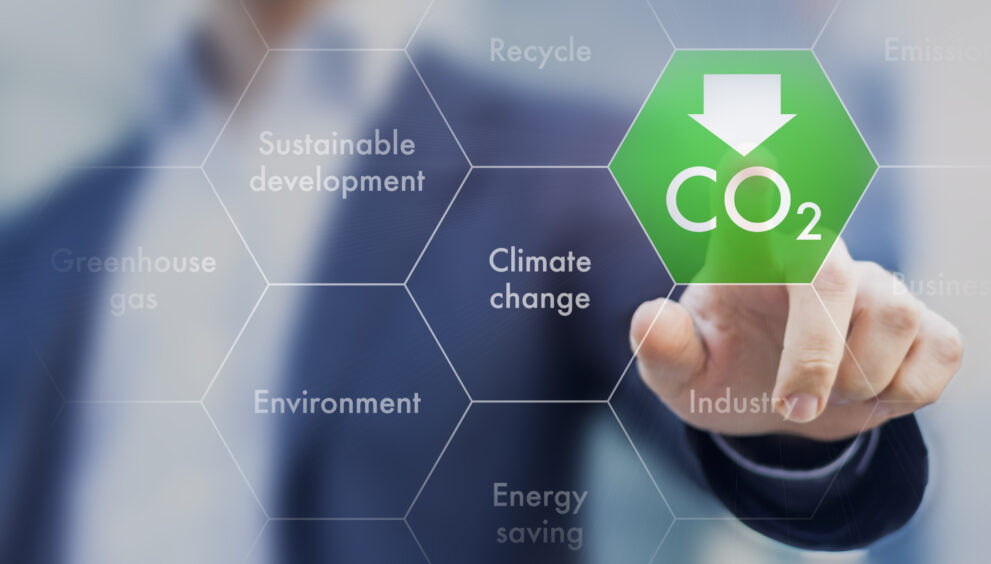Blockchain’s Role In Halving Global Carbon Footprint By 2050

With scientists calling for a concerted global effort to reduce global warming, blockchain technology is slated to play an important role in helping businesses reduce greenhouse gas emissions
The global fight against climate change has gained momentum since the Paris Agreement was adopted in 2015, with 196 countries committing to sustainability goals. Greenhouse gas emissions, primarily driven by energy consumption, constitute a significant portion of the environmental challenge. Alarmingly, more than 40 per cent of these emissions originate from electricity usage in both residential and business settings, as per analysis by Climate Watch, utilising data from the International Energy Agency (IEA).
To address this concerning trend, it’s crucial to embrace more efficient technology solutions, spanning business operations, industrial processes, and energy management in buildings. Blockchain technology is emerging as a pivotal enabler in this transition, with the potential to assist organisations worldwide in achieving net-zero carbon emissions and reducing the global average carbon footprint from 4 tons to 2 tons by 2050.
The carbon footprint, a measure of an individual, group, or organisation’s greenhouse gas emissions, is a pressing concern, especially in developed economies with higher industrial activity and consumption levels. The imperative is to drive transformative changes and enhance energy efficiency to combat climate change effectively.
While transportation contributes 12.6 per cent of total emissions, human activities within residential and commercial buildings account for 18 per cent of all greenhouse gas emissions, making these areas pivotal for efficient solutions. Improving energy efficiency is paramount in the battle against climate change and necessitates more than just the adoption of renewable energy sources, according to the World Resources Institute (WRI).
Blockchain, a form of distributed ledger technology (DLT), underpins a multitude of startups shaping the Web3 ecosystem. Beyond its renowned use in cryptocurrencies, blockchain is revolutionising transaction processing across various sectors, including banking, logistics, Internet of Things (IoT), healthcare, and governance.
By streamlining traditional systems and reducing the need for human intervention, blockchain technology can significantly cut energy consumption across operations. While some blockchain networks, like Bitcoin, are criticized for their energy-intensive Proof-of-Work (PoW) consensus mechanisms, many are transitioning to the more energy-efficient Proof-of-Stake (PoS) model.
Blockchain protocols enable rapid and cost-effective cross-border transactions, offsetting the energy consumption involved in maintaining these decentralized web-based systems. Moreover, decentralized finance (DeFi) platforms are paving the way for digital banking, eliminating the need for physical office spaces, and contributing to carbon emission reduction.
In addition to cryptocurrency, blockchain technology is enabling organisations to monitor their carbon footprint using IoT-compatible smart sensors, identifying areas that require immediate attention. This technology allows energy companies to distribute electricity efficiently, reducing transmission losses and enabling peer-to-peer energy trading that reduces the need for extensive energy infrastructure.
At the organisational level, blockchain is streamlining operations, eliminating intermediaries, and reducing material, energy, and transportation costs. Companies like Oracle, Microsoft, SAP, Accenture, and more are developing enterprise solutions that enhance supply chain management, improve traceability, and ensure compliance.
As blockchain technology continues to evolve, its integration into various processes holds the potential to transform business operations and significantly reduce carbon footprints. With ongoing refinements and adoption, the journey to halve global carbon emissions is set to receive a substantial push from this revolutionary technology.
For more insights on unlocking Scope 3 emissions and how India Inc. can lower them, join us and the sustainability stalwarts from different industries on the 21st of November at The St. Regis, Mumbai. Register here https://bwevents.co.in/bw/the-sustainable-world-conclave-mumbai/#Register to grab your spot!






































































































































































































































































































































































































































































































































































































































































































































































































































